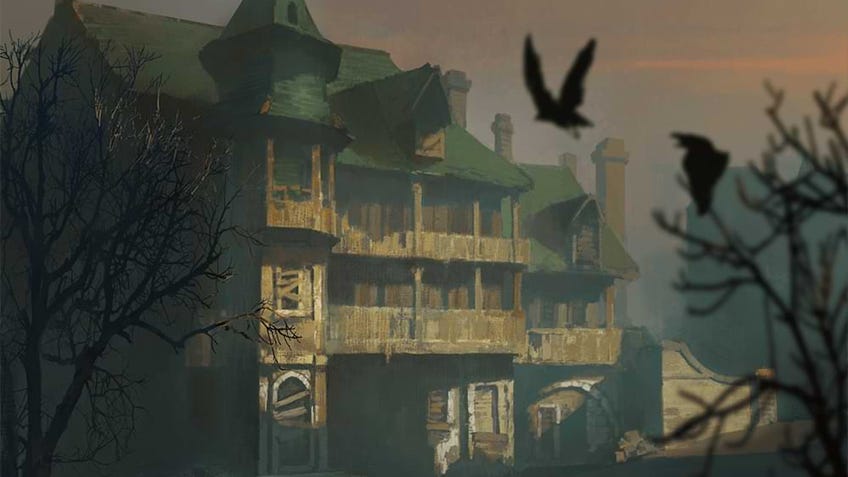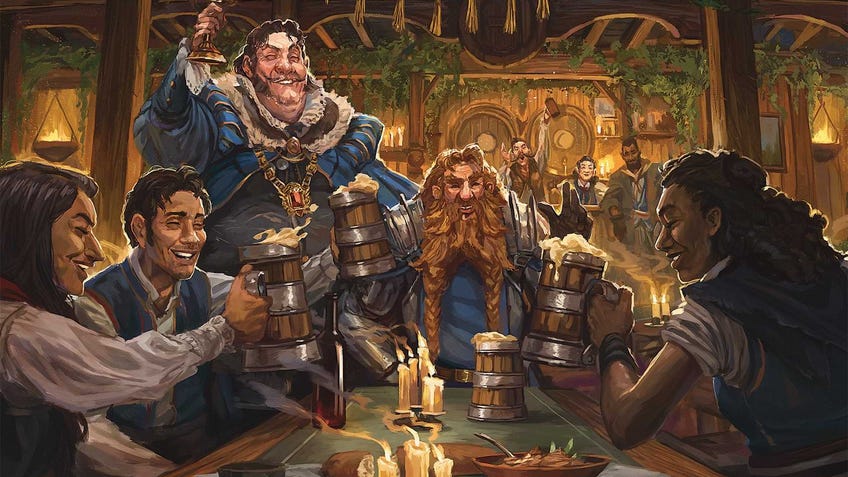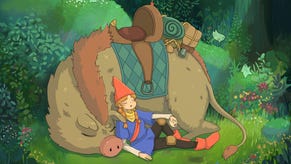Dungeons & Dragons' latest playtest wants to sell you the dream of being a fantasy landlord
NIMBY subclass not yet included.
Dungeons & Dragons previewed another peek inside the upcoming updates (decidedly NOT editions) to its massively popular tabletop RPG, this time featuring the new Bastion system. This player-focused activity housed inside the Dungeon Master’s Guide (ugh) effectively allows adventurers to create and maintain a little slice of domesticity of their own, while also filling it with hirelings, industry and downtime systems.
Outlined in a new Unearthed Arcana - Wizards of the Coasts’ method of playtesting new material - Bastions unlock at level 5 and can take whatever form the player wishes. The system is setting agnostic and apparently quite flexible to suit the needs of any campaign. Whether players want a quiet garden of herbs and rare plants, a bustling watering hole doubling as a fence and info broker or a fiery forge, Bastions want to give players expression in the form of property ownership.
Bastions will offer roleplay opportunities by being literal player-character housing. Everyone starts off with a bedroom, kitchen and other basic necessities but can expand that framework to include specialised rooms that bestow mechanical benefits, new abilities and sources of income or items. Principal designer Jeremy Crawford mentioned the high customisability of Bastions - players can change the size and orientation of individual rooms and even map out a blueprint of their home away from adventure.
Expanding a basic home will require resources (read: gold) and time, but Wizards of the Coast want to entice players with the promise of hirelings and protectors specially trained to care after and protect their material investment. Players will take a Bastion turn every seven in-game days, during which they can order their peons to root out the fantasy gutters and take out the fantasy garbage.
Specialised buildings, such as a gambling hall or arcane sanctum, will unlock unique orders and often earn a new currency called Bastion Points. Players can spend Bastion Point to acquire a new magic item upon level up, increase their influence in the Bastion’s region or even revive a character from the dead. Special facilities will also allow players to harvest food, train skills, empower themselves and other items and research information, legends or topics of interest to the current adventure.
Bastions can and will attract attention while the player-character is off looting, and that company might be eclectic neighbours or the underlings of that warlord they pissed off in the previous session. Defenders will literally lay down their lives to protect your passive income, and you don’t even need to worry about budgeting for their pay - though you can buy them cool outfits and add magical critters to their ranks. There’s also nothing more to defending a Bastion than rolling a die and determining how well (or poorly) your defenders fared.

The irony of home ownership being a headline feature in a fantasy RPG is not lost on me, nor is the crass way this implementation reproduces some of the worst impulses of the real world’s view of owning property and living within a community. Player bastions are cut off from society by dint of mechanics, if not also by an individual player’s chosen fiction.
Community members might show up on a Bastion’s doorstep seeking aid, succour or shelter from persecution, but these are all burdens laid at the feet of the building’s owner - the player. They can produce food and goods, magical items, and even a fully passive income, but it is all funnelled towards the enrichment of the player by either increasing their ability to enact violence or fattening their purse. The Bastion system laid out in Unearthed Arcana only explains how to feed that wealth back into the player’s property. Want to pull the nearby village out of near poverty, or simply increase the wages of the butler that you named and wrote a backstory for last session? That’s between you and the Dungeon Master.
There’s more than a passing resemblance to Blades in Dark’s downtime activity system (along with a surprising amount of The Sims), and smaller RPGs such as Mountain Home build an entire framework around maintaining somewhere to live. But most of these examples tie the system into the title’s ethical framework. Blades in the Dark follows a crew of thieves hoping to win an inch of comfort in a world that bleeds them for every meal, and Mountain Home focuses on a group of dwarves hoping to reestablish their clan in a foreign, hostile environment at all costs.
What kinds of stories will Dungeons & Dragons allow players to tell with this new system? The cynic in me would say the same as its core rules: a power fantasy of exceptional individuals who aren’t given the tools to roleplay care and community with the same depth as enacting violence and enriching themselves. Random table rolls might send the fantasy cops to arrest a player's ex-felon stablehand, and if they neglect a Bastion the rules as written can only imagine it being abandoned, looted and razed - in that order. Without the direct intercession of the player, what are the smallfolk to do but become aimless criminals?
The Bastion system could be so much more. If Wizards of the Coast wants to sell me another power fantasy, don’t give me rules for roleplaying a neoliberal suburbanite, landlord or landed gentry. Let me practise radical community action, repatriating gold coins from cruel dukes and constructing community gardens protected by Awakened Trees and myconids. It’s not grizzled and action film-worthy, but I’ve experienced enough wealth hoarding and housing violence in the real world.
Read the full Unearthed Arcana, which also includes revisions to 10 cantrips, on the D&D Beyond website. The publisher will open public feedback forms on October 19th.










